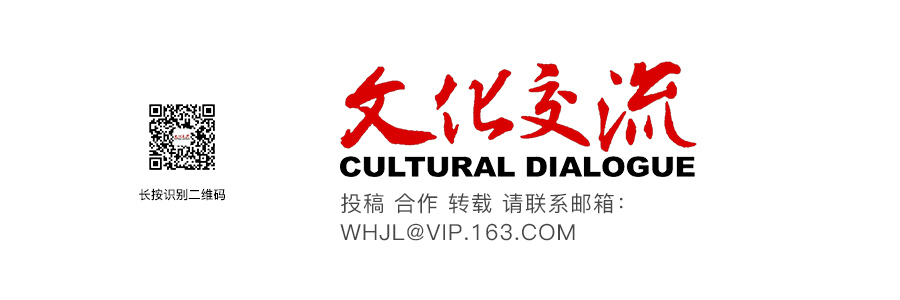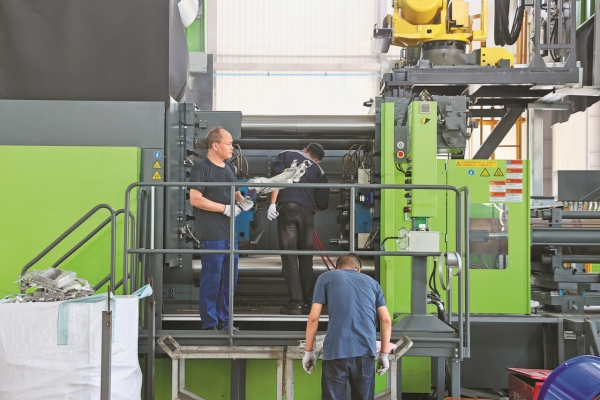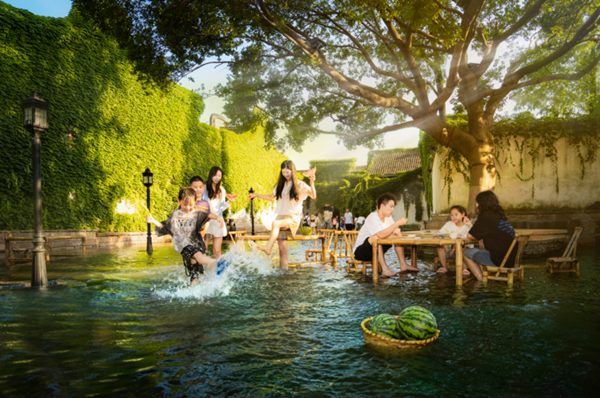今年,《梁祝》60岁了。
哪个《梁祝》?你可能会问这个问题。
这个故事,经过无数版本、剧种的改编、创作,早已成为中国人的一个文化符号。
但,一看名字就能秒哼旋律的,只有它:《梁祝》小提琴协奏曲。
5月4日。
“我给我的同伴陈钢打了一个电话。”
电话通了——“喂,陈钢。”
“你是谁?”
“我何占豪。我很有感慨,60年啊,60年前的今天,你弹钢琴,我拉提琴,这才是《梁祝》真正首演啊!”
何老说到这里,台下的我们忍不住鼓掌,有人在抹眼角。
今年,写这支曲子的他,也86岁了。
“好激动,到了杭州,到了浙江,就到了娘家。”修身黑色西装、背心、条纹衬衣,扣子扣到第一颗——不是所有人都能穿好三件套的,眼前这个86岁老人身上的精气神,是音乐养成的。
何占豪,世界级著名作曲家,1958年率“小提琴民族学派实验小组”与陈钢联袂创作小提琴协奏曲《梁祝》。1959年5月27日,作品首演于上海兰心大戏院,一炮而红。
5月上旬,浙江省庆祝《梁祝》小提琴协奏曲问世60周年暨“今夕何夕”何占豪师生音乐作品三部曲系列活动在杭州举行。一共三场演出——何占豪作品音乐会、何占豪学生代表作品音乐会、何占豪筝乐作品音乐会相继在杭州剧院和浙江音乐学院音乐厅上演。何占豪亲自指挥自己的作品音乐会。
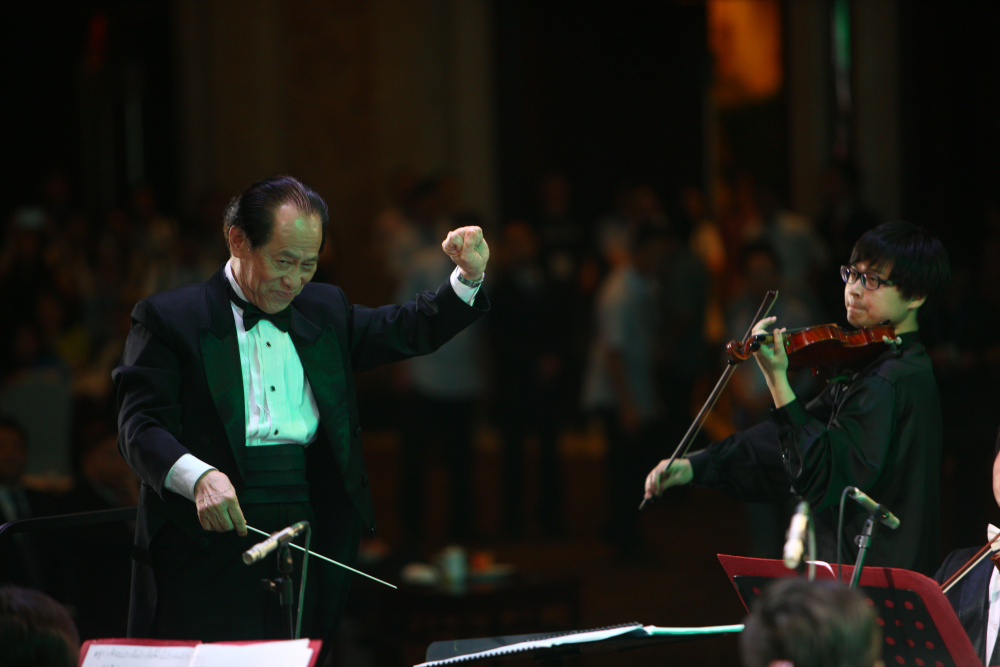
(一)
7年前,我去何老家拜访这位音乐老顽童。老人指着自己年轻时的照片:“你看帅不帅?要是我再年轻个四五十岁,肯定迷倒你。你说你愿不愿意?”再看看自己,“不过人家都说我越老越帅了。”
7年过去,老顽童依然风度翩翩,坐得笔挺,身材管理得比年轻人都要好。他身边坐着的爱徒、香港中乐团艺术总监兼终身指挥阎惠昌忍不住“表白”:“看到你那漂亮的皮肤、煽动性的语言和动作,何老师您一定可以继续带领我们民族音乐创作出新的作品。”
何占豪的作息是这样的,晚上8点多晚饭,吃过睡觉,睡到晚上10点起来开工作曲,到凌晨两三点,再睡到早上7点多。而下午4点半到5点,是他的锻炼时间。过去跑步打篮球都行,现在就快走。
讲话时,何占豪手里其实捏着一个稿子,但他一点不看,一口气说了20分钟。阎惠昌真是太了解他了,“太有煽动性”——这种煽动,是因为动情。
“我想对媒体、对学生们,再讲讲为什么《梁祝》会出自我这样一个人之手,不可思议。因为我17岁才接触小提琴,18岁才开始拉小提琴,全国有这么多音乐世家,为什么会出自我这样一个浙江越剧团普通演奏者之手,什么道理?”
(二)
关于《梁祝》的问世,何占豪在这60年里,有一句反复说起的名言:“没有越剧就没有《梁祝》。”
他是浙江诸暨人,听着越剧和绍剧长大。12岁到杭州,进了浙江文工团当演员,后来转入浙江省越剧团乐队,学习小提琴。
“我们是新中国第一代青年人。当时有这样一句话:中国一穷二白,但是一张白纸上可以画最美的图画。这句话激励了我们这批年轻人——浙江越剧团16个人。我们这批小青年就对作曲老师讲,我们创作民族音乐也可以把世界乐器拿过来,我们的乐器不要这么单一,要向西方学习。这样我们的乐队才开始学习小提琴。”
小提琴和民乐混搭在一起演奏,在当年让人不敢置信,太叛逆了。团里有一批演员也反对:你们停止吧,你们破坏了越剧风格!
何占豪当时想,这个乐器这么好听,怎么会破坏越剧风格?何占豪当时很懊恼,因为不能改革探索了。“我很苦闷,那时候学小提琴也不容易,杭州一个小提琴老师也没有,我是找到了之江大学的语文老师,在那位业余(音乐)老师那边学的。”

这时,在何占豪眼中《梁祝》问世的真正的源头,著名二胡演奏家贺仁忠出现了。
他对何占豪说,你不要难受,反对不一定对,让我来教你小提琴如何体现民族风格。
这位麻辣教师亲自教何占豪如何用小提琴拉《二泉映月》。
1957年夏天,何占豪考入上海音乐学院,成为管弦系小提琴专业的一名学生。
大家很都奇怪,这个人怎么会用小提琴去拉《二泉映月》?
“其实我在音乐学院,小提琴水平倒数第三名,但说到演出用小提琴拉《二泉映月》,只有我能独奏,他们都给我伴奏,包括俞丽拿在内。”
当时的小提琴曲子中,没有什么中国作品。所以何占豪有一个想法,就是想让老百姓听懂小提琴。
为了探索民族风格的现代音乐创作,1958年初,上音管弦系选拔“尖子生”,组成“小提琴民族化实验小组”,成员包括何占豪、俞丽拿、丁芷诺、沈西蒂、张欣、朱英等。
“所以我为什么会用小提琴拉越剧,并且把这种风格传到上海音乐学院,源头在浙江。所以《梁祝》是中国音乐界、戏曲界几代人的劳动成果,是集体智慧的结晶,我何占豪真的没有什么。”
(三)
中华人民共和国国庆十周年前夕,“实验小组”讨论搞一个小提琴协奏曲给共和国献礼。当时,“实验小组”上报了三个选题,《女民兵》《大炼钢铁》和《梁祝》。何占豪提议的《梁祝》排在最末,按照时代背景来说,大家都认为前两个入选的可能性要远远大于《梁祝》。
“当时我们的党委书记叫孟波,是延安来的老作曲家,他毫不犹豫地在《梁祝》上画了一个钩。他说何占豪既会越剧,又会小提琴,只有这个有希望。”何占豪感叹,没有孟波的一槌定音,也就不会有《梁祝》。
然而,这在当时是一种冒风险的选择——拿西洋乐器演奏中国乐曲,洋不洋、中不中,好像是在糟蹋高雅艺术。
组织“实验小组”的管弦系老师刘品鼓励何占豪大胆探索民族的交响乐。
“当时,刘品带我们‘实验小组’成员赴温州慰问解放军。他和我睡一间房,晚上促膝交谈到深夜。”第二天一早,刘品有事先回上海。何占豪一觉醒来,看到桌上放着一盆橘子,盆底压了一张老师留下的纸条。萌老头爱拿这件事开玩笑:领导苦口婆心地做思想工作,还“做到了床上”。
于是,何占豪与同小组的丁芷诺合作,开始创作《梁祝》协奏曲。
在浙江越剧团乐队工作多年,许多熟悉的越剧旋律都在他的脑子里,比如“同窗三载”小快板主题,就是根据他以前写的越剧折子戏“跑驴”中的一段插曲改编而成的。
小的段落有了,但全曲摄人心魄的着力点在哪里?
上海人民大舞台当时在上演尹派越剧《红楼梦》。为了搜集创作素材,他接连几个晚上都去听。尹桂芳那句“林……妹……妹……呀”,一下子触动了何占豪。他用具有戏曲风格的演奏手法,在小提琴上反复试奏,创作了全曲的核心:《梁祝》爱情主题。
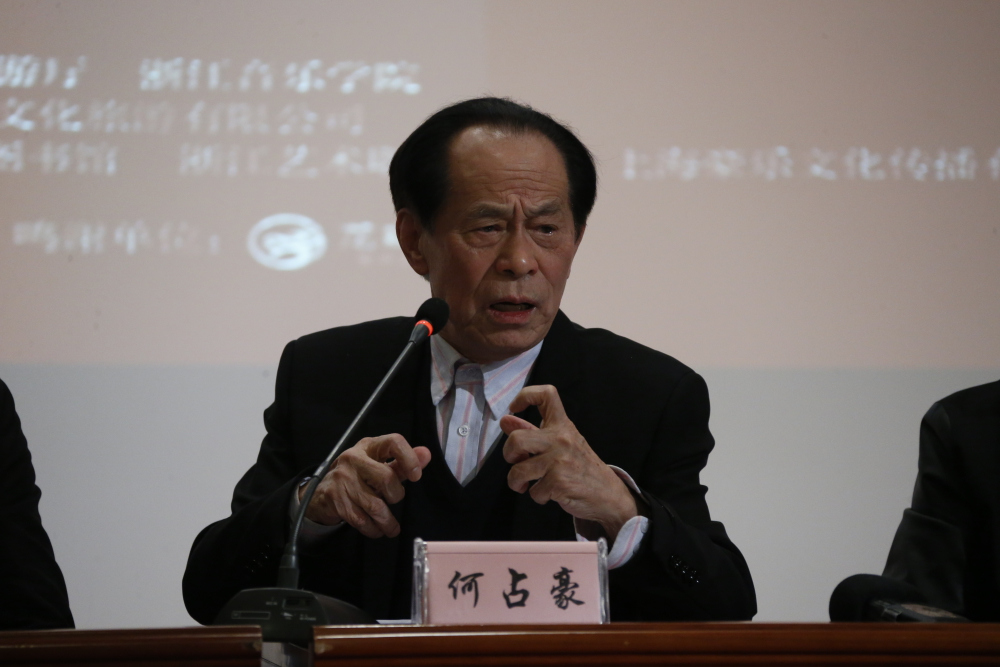
《梁祝》爱情主题和三载同窗副题都写出来了,但是小的合奏写好后,大的管弦乐队的配器他们不会写。
当时,他找到作曲系的陈钢来帮忙。
1959年2月,何占豪与陈钢正式合作,对乐曲的曲式进行了重新规划,旋律部分主要由何占豪写,钢琴伴奏和乐队伴奏部分由陈钢写。
初稿完成之后,他们到院里演奏,何占豪拉提琴,陈钢弹钢琴伴奏,到祝英台投坟殉情就结束了。
孟波问:“为什么没有化蝶?”
何占豪回:“人死了不会化蝶,我们年轻人不相信迷信。”孟波就对他们说,还是要加上“化蝶”,这是一种浪漫主义的写作,也是我们的传统。这才有了尾声中的一段“化蝶”,缠绵悱恻又充满新生力量。
1959年5月4日,《梁祝》在上海音乐学院大礼堂首次试演,就是3天前何占豪给陈钢打电话的那个画面。
5月27日,《梁祝》在上海兰心剧院首次公演,参加上海市音乐舞蹈会演(即“上海之春”的前身)。新作首次对外公演,选谁来演奏也是一个问题。当时有两个人选,一位是“实验小组”的俞丽拿,另一位是她的同班同学沈榕。
何占豪是这样描述两位同学的:俞丽拿的演奏充满了激情,但音准略有欠缺;沈榕音准没问题,但激情不如余丽拿。
考虑到新作品需要用激情来打动听众,最终决定俞丽拿首演,上音学生管弦乐队协奏,指挥系的四年级学生樊承武指挥。
当最后一个音符落下,台下静默几秒后,霎时掌声雷鸣。
主创人员们在台上谢幕多次,掌声还是响个不停。“因为是新作品音乐会,我们根本就没有准备返场曲目。最后没辙了,只好把整首曲子从头到尾再来一遍。两遍加起来,一共拉了50分钟。”俞丽拿说,这是她唯一一次在舞台上把同一支曲子演奏了两遍。
从这天起,《梁祝》风靡全国。当年26岁的何占豪作为主创之一,也成了家喻户晓的名人。信像雪片一样飞来,“连俄罗斯姑娘都写信来追求我。”
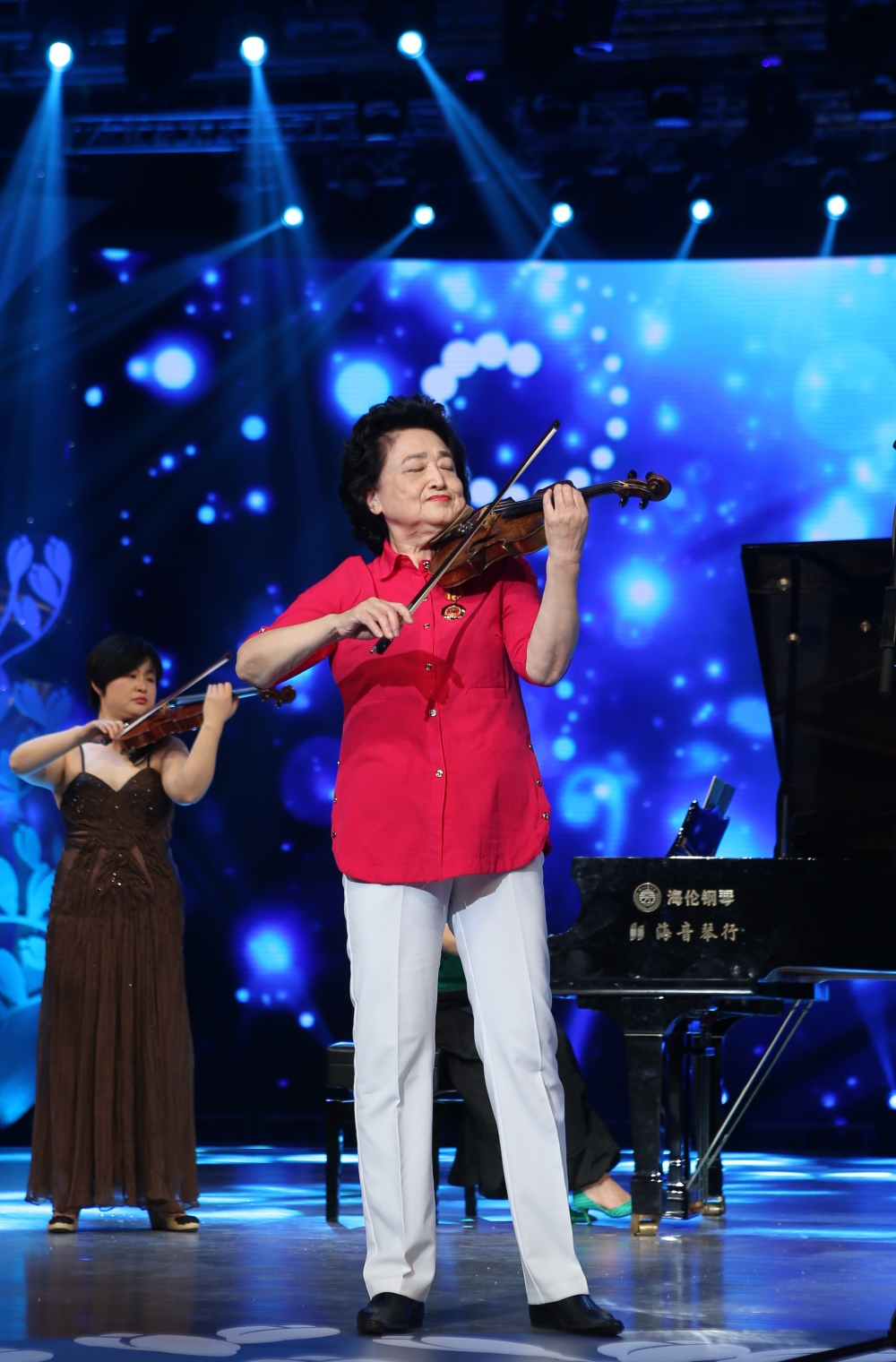
(四)
如今,何占豪还在创作《梁祝》。民族音乐现代化,是他说了一辈子的话,也是他一生的追求,他将《梁祝》改编成了高胡、二胡、琵琶和古筝协奏曲。前段时间,群体古筝加钢琴的新版《梁祝》在上海亮相。
26岁,因为《梁祝》,“一曲成名”的故事真的发生在这个又帅又有才的年轻人身上,但这个符号,也让何占豪这么多年来有苦说不出。
“其实很不公平,《梁祝》不能概括我的一切。因为《梁祝》太有名了,它的盛名把我的《莫愁女》《孔雀东南飞》《别亦难》等一大批作品湮没了。”有一次,有位香港记者来采访,问起他的其他作品。“我说你知道《别亦难》是谁写的吗?他说是徐小凤唱的,我说那是我写的。”那位记者非常惊讶:“我不知道啊,那是你写的啊?”
“弹指一挥间,转眼60年,前浪推后浪,我的学生都成了今天的大师,指挥大师、作曲大师、一流的演奏家。自己年轻的时候培养了一批能给国家挑大梁、带动国家艺术水平的艺术家,他们能在今天国家的艺术活动中发挥这样的作用,这是我最高兴的一件事。”
他看着身边齐齐坐着的一排学生,继续说——
“虽然你们都是大师,但我希望我们当年的那种探索的精神你们不要丢掉。不但自己要这样做,希望你们把这种精神一代代传下去。我相信我们中国的音乐文化,在你们一代或再下一代会达到世界先进水平。‘越是民族的越是世界的’,这话只对一半,只有把民族的艺术提高到世界先进水平,才能对人类有所贡献。”
(图片除署名由新华社及视觉中国提供)
86-Year-Old Composer Talks about 60-Year-Old Violin Concerto
The year 2019 marks the 60th anniversary of the creation and debut of the violin concerto (Liang Shanbo and Zhu Yingtai or simply Liang & Zhu as known to most Chinese music lovers).
In early May 2019, a series of activities was held in Hangzhou in commemoration of the 60 years of the concerto. The 86-year-old He (the surname in Chinese is pronounced most like “her” in English) Zhanhao came to Hangzhou. He not only attended a forum on the composition, but also conducted at a concert that featured his other major compositions. Three concerts were held commemoratively. One featured He’s compositions. One presented works by He’s students. One highlighted He’s compositions for , a Chinese stringed instrument.
He Zhanhao is a legend. A native of Zhuji in Shaoxing where Yueju Opera originated and flourished, he grew up fully exposed to the beauty of Yueju Opera and Shaoju Opera arias. He came to Hangzhou at 12 and became an artist. He joined the band of Zhejiang Yueju Opera Troupe and began to learn violin. At that time, there were 16 young musicians at the troupe. They proposed that western instruments could also be used to accompany Yueju Opera arias. They actually did it. But they ran into strong opposition. The mixed sound of Chinese and western instruments puzzled many people. Some artists said violin ruined the style of Yueju Opera. He Zhanhao was disheartened and disappointed. “How could such a beautiful sound ruin the Yueju Opera style?” He couldn’t find a convincing answer. At that time, he was taking violin lessons from a language teacher at Zhijiang University. Then he met He Renzhong, a famed instrumentalist. “Don’t lose heart. Their objection doesn’t mean they are right. Let me teach you how to play the Chinese traditional style on the violin,” said the teacher encouragingly. He Renzhong taught He Zhanhao how to play , a famed masterpiece. In the summer of 1957, he got accepted by Shanghai Conservatory of Music as a violin major. Professionally, he was one of the poorest violinists in the department. But when it came to the performance of on the violin, he was the only one who could do it. His teachers and classmates all wondered how he would have chosen to play a traditional masterpiece on the violin in the traditional Chinese style.

The creation of the concerto sounds like a legend, too. In early 1958, some violinists organized themselves into an experimental group with the aim of creating violin compositions in the traditional Chinese style. The group came up with three composition proposals. The first proposal picked a theme that would sing of militia women; the second would be an ode to the nation’s massive drive to boost steel production; the third idea was Liang Shanbo and Zhu Yingtai, proposed by He Zhanhao. The CPC secretary of the department Meng Bo, a veteran composer who had worked at Yan’an, the headquarters base of the communists during China’s war of resistance against Japanese aggression, took a look at the three proposals and picked He’s idea. Meng explained his decision later this way: He Zhanhao, a violinist with wide-range knowledge of Yueju Opera arias, was the only hope of making something unusual. He Zhanhao wrote separate pieces based on the Yueju Opera arias which he was extremely familiar with. He worked in collaboration with Ding Zhinuo, a member of the experimental group. With some pieces written, He wanted to write a theme that would best portray the romance. After watching Yueju Opera play at Shanghai People’s Theater for several nights on a roll, he found his inspiration. He tried the melody out on the violin repeatedly until it was perfect. With all the melodies ready, he needed someone who could write a full score for a symphony orchestra. He went to Chen Gang for assistance. A student composer at the conservatory, Chen wrote a score for piano and a score for a symphony orchestra. In February, the two young composers were ready to present their work for audition. He Zhanhao played the composition on the violin, accompanied on piano by Chen Gang. Meng Bo asked why the piece did not have the traditional finale in which Liang Shanbo and Zhu Yingtai become butterflies and fly away together happily. He Zhanhao explained he deliberately left it out because he feared it might be associated with superstition. Meng said the butterfly metamorphosis part was necessary for the composition, for it not only added a final touch of romance to the ethos of the composition but also highlighted the essence of Chinese tradition. So the last part was added. On May 4th, 1959, the concerto was first performed at the concert hall on the campus. Three days before the concerto’s public debut at Lyceum Theater, Yu Lina was picked to be the solo violin. The public debut brought down the house and the audience burst into a long standing ovation. The composers and musicians answered the curtain call several times. As they hadn’t expected such a sensational success, the orchestra hadn’t prepared any encore. So the orchestra gave the performance for the second time. He Zhanhao made his name overnight. The concerto became a national hit and went international. It has long been a signature masterpiece of Chinese music.
Today, He Zhanhao thinks he owes the colossal success to Yueju Opera, an opera genre that touched his heart when he grew up, to the combined efforts of Chinese musicians and opera artists in many generations.
He Zhanhao as a composer has many regrets, however. He regrets that his other music works are unfairly eclipsed by the fame of the concerto he composed in collaboration with Chen Gang when he was just a 26-year-old student. Over the past six decades, many of his students have grown up to be prominent conductors and composers and musicians. They are now prominent masters.
